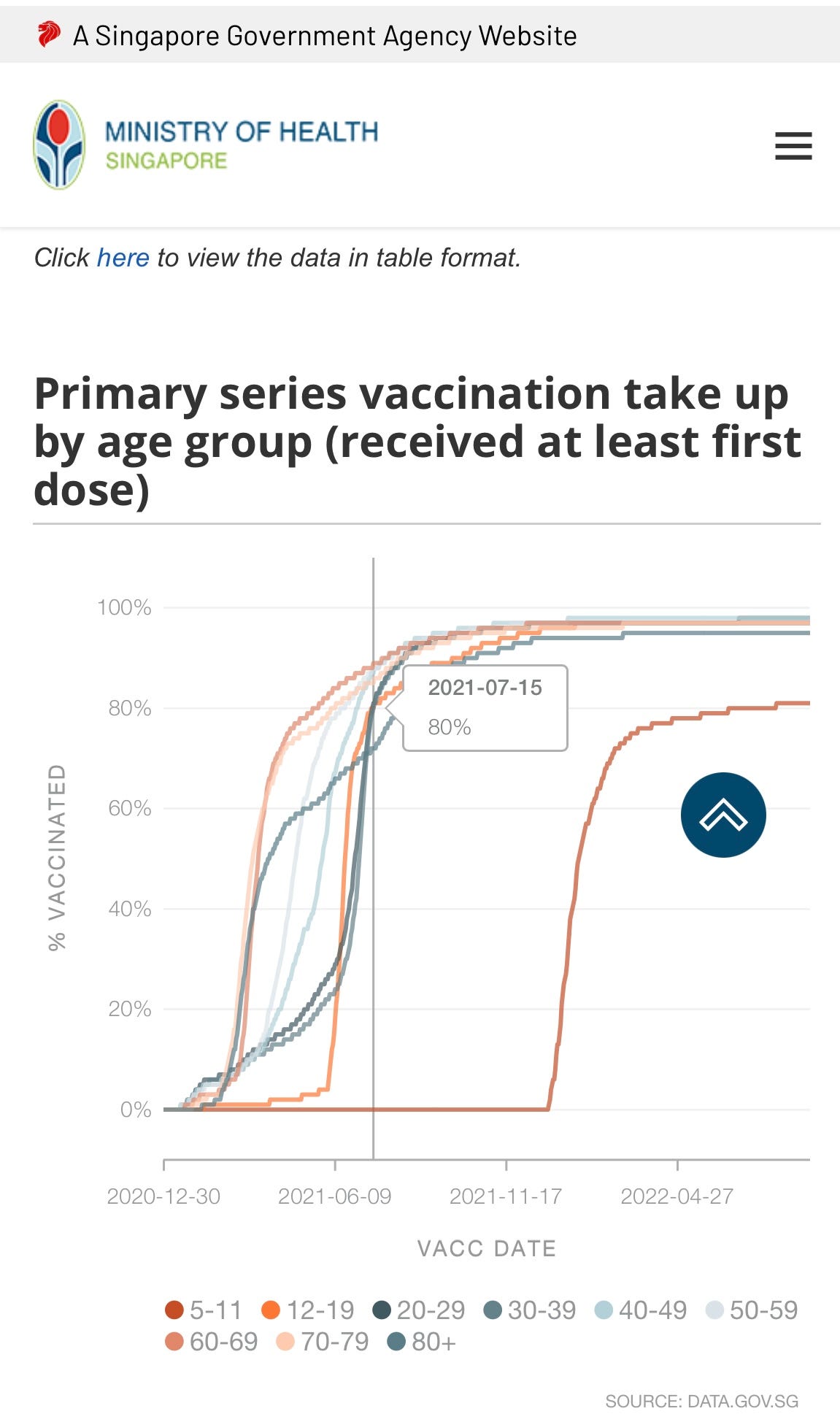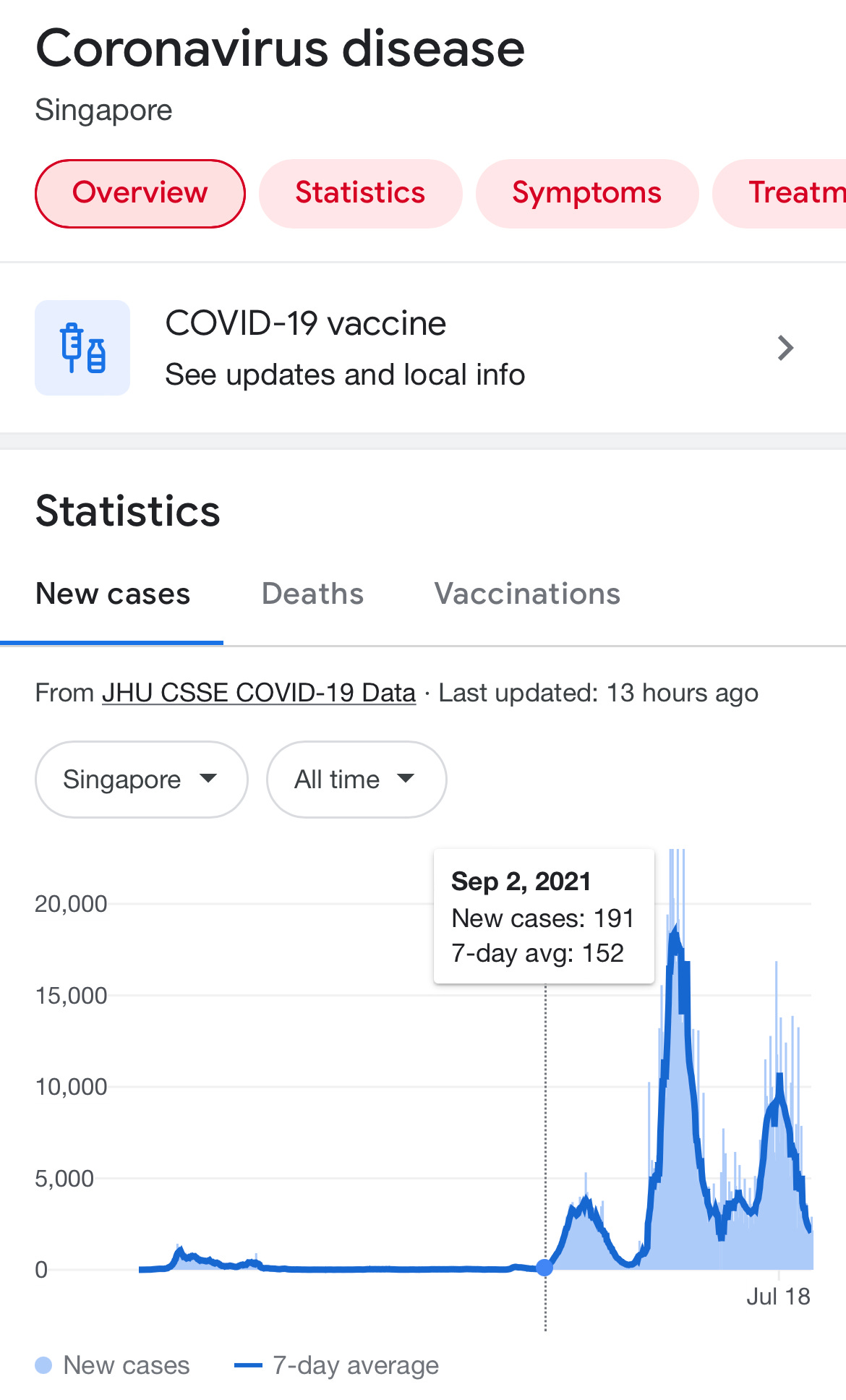Births are plunging, nine months after mass Covid vaccinations
The Asian city-state is famously uptight. It punishes criminals with caning and has prohibited chewing gum since 1992. (Do not under any circumstances deal drugs in Singapore; a 41-year-old man was sentenced to death after being caught with two pounds of cannabis in 2018.)
So when Singapore told its nearly 6 million residents to be vaccinated against Covid, it had very high compliance.
What is particularly interesting – though unsurprising – is how well Singapore stratified vaccine administration by age. As the chart below shows, in a few weeks in June and July 2021, nearly every Singaporean adult between 20-39 – childbearing age, essentially – received their first Covid vaccine jab.

—
(SUBSCRIBE NOW FOR MORE STORIES THAT WILL TERRIFY YOU)
—
The incredibly rapid uptake of vaccines among young Singaporean adults offers a natural experiment in the effect of mRNA shots on fertility. (Roughly 98 percent of all the jabs Singapore gave were mRNA from Pfizer or Moderna. Chinese vaccines used traditional inactivated virus technology made up the rest.)
You will not be surprised at this point to learn that Singapore publishes comprehensive figures on births and deaths every quarter.
Like other East Asian countries, Singapore is suffering severe baby bust. The average woman in Singapore has fewer than 1.2 children, barely half the birth rate needed to avert a long-term decline in population.
As low as the birth rate was, though, it had remained stable for a decade. Even Covid did not meaningfully change the number of births – 39,259 in 2019, 38,590 in 2020, and 38,672 in 2021.
In the first two months of 2022, Singapore received welcome news. Births actually rose about 7.5 percent.
Then came March. Again, Singapore began mass mRNA vaccinations of women (and men) of childbearing age in June 2021; March 2022 is exactly nine months later.
In March, the increase in births abruptly reversed. Between March and June 2022 – the most recent month for which figures are available – Singapore has recorded about 1,000 fewer live births compared to 2021, a decline of 8.5 percent. The drop has been consistent each month.
(Births in Singapore. See how the blue line started falling below the others in March? That’s births in 2022. That’s not good. Also, I know it’s a photo of a laptop screen. Bear with me.)

—
A 16 percent shift in birth rates practically overnight is, to say the least, highly unusual.
And Covid itself, or “long Covid,” whatever long Covid may be, cannot be blamed. Singapore had essentially no Covid until the fall of 2021 (well after mass vaccinations were complete, but that’s another story).

—
By itself, a four-month decline in birth rates in a single small country might not be cause for serious concern, despite the striking timing.
But Singapore is far from alone.
For example, Sweden has reported a similar decline this year, with a similarly close connection to vaccinations last year. It is hard to imagine two countries more different ethnically and geographically than Sweden and Singapore. They even had diametrically opposed Covid lockdown policies. Yet both are seeing the same drop in fertility.
The decline in births that countries like Singapore are seeing is large by historical standards. But it has lasted only a few months, and it comes against the backdrop of a long-term decline in fertility rates. Further, not every country has seen them.
In addition, the mRNA shots are known to cause disruption in menstrual cycles and declines in sperm counts that can last for several months. It is possible that those changes alone account for the entire drop, and that if and when they reverse birth rates will return to baseline. It is possible birth rates are already returning to baseline, since births by their nature are a lagging indicator of fertility.
But enough countries have now seen these changes that we would – at a minimum – be well advised to ask scientists who specialize in fertility what they are seeing. And this is yet another reason – as if any were needed – that healthy adults of childbearing age should avoid novel biotechnologies like mRNA vaccines.
Source – https://alexberenson.substack.com/p/more-frightening-news-about-fertility
